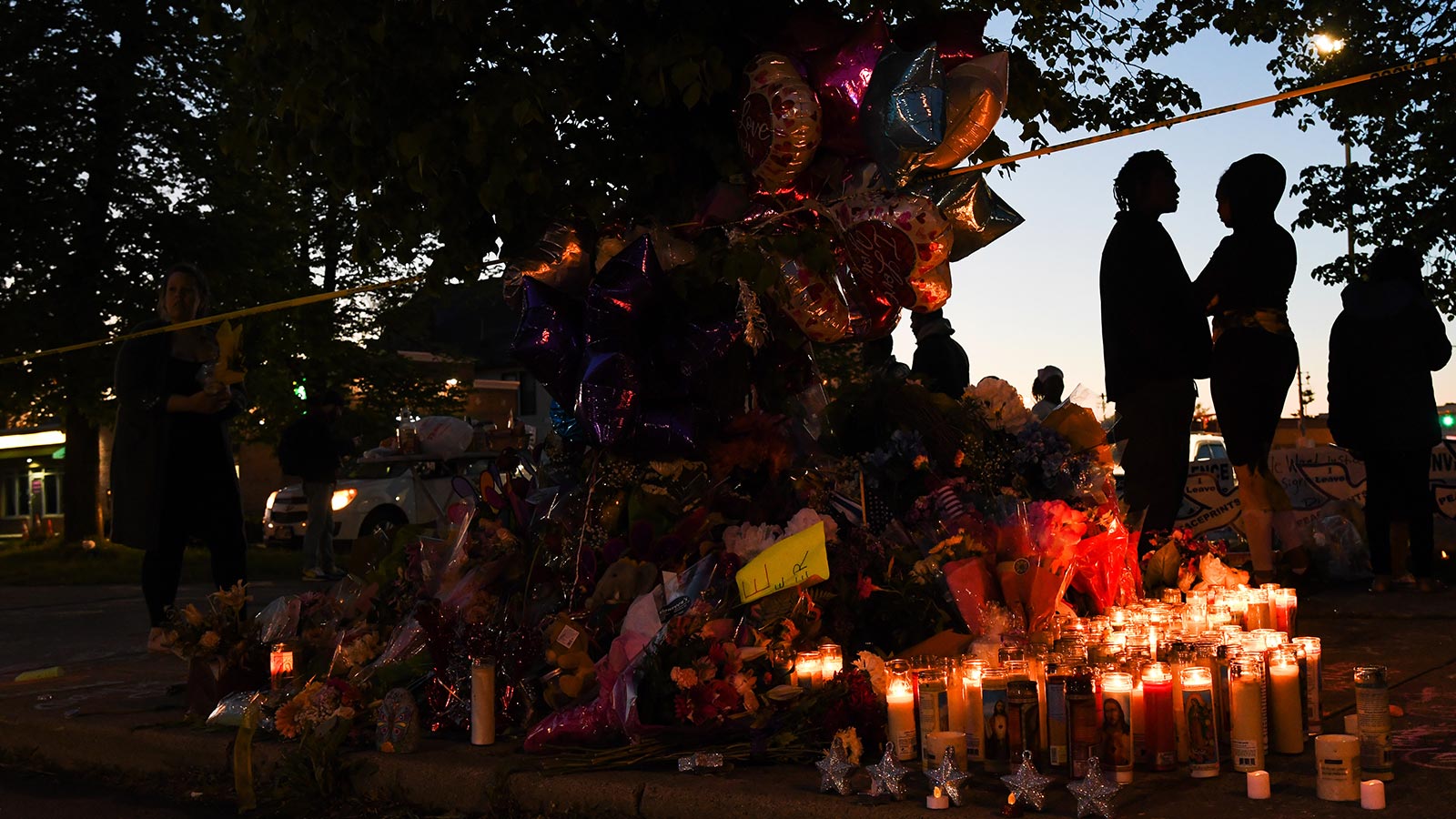Two years after George Floyd’s murder, nearly 8 in 10 Black Americans say there has been little or no improvement in how police treat Black people, according to a Washington Post-Ipsos poll.
By Silvia Foster-Frau, Arelis R. Hernández, Scott Clement and Emily Guskin —
Three-quarters of Black Americans are worried that they or someone they love will be attacked because of their race, according to a nationwide Washington Post-Ipsos poll conducted after a gunman killed 10 people at a Buffalo supermarket, allegedly targeting members of the mostly Black neighborhood.
The Post-Ipsos poll of Black Americans finds most are saddened and angered by the attacks, but just 8 percent say they are “surprised.” Even before the shooting, in earlier poll questioning, Black people saw racism as one of their greatest threats. After the attack, only 10 percent think the problem of racism will improve in their lifetimes, while a 53 percent majority think it will get worse.
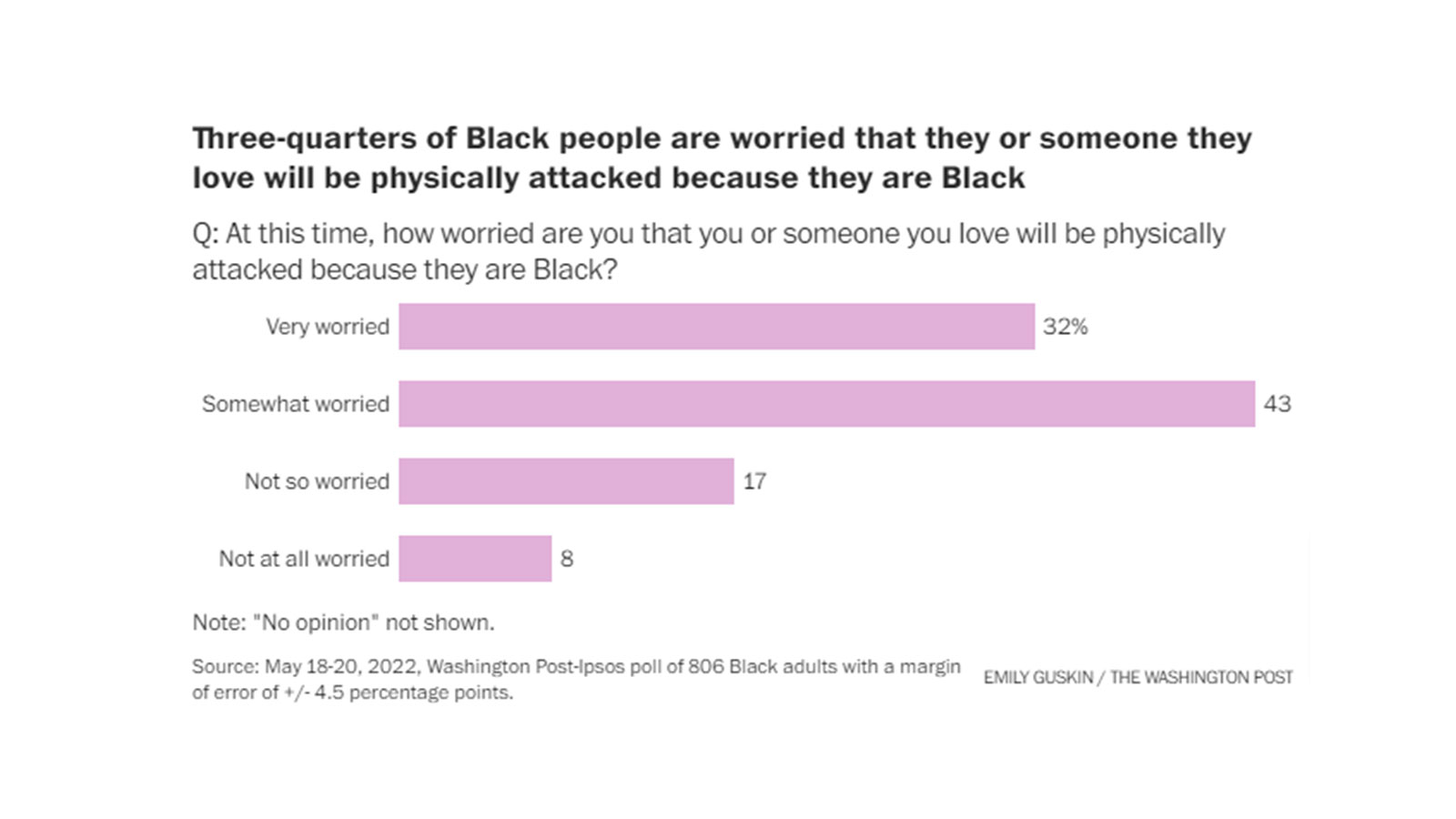 Authorities believe the Buffalo shooting suspect published a 180-page diatribe before the massacre, detailing his plans to kill Black people and describing himself as a white supremacist and a terrorist. Of the 13 people shot, 11 were Black. Federal officials have said they are pursuing the case as a racially motivated hate crime.
Authorities believe the Buffalo shooting suspect published a 180-page diatribe before the massacre, detailing his plans to kill Black people and describing himself as a white supremacist and a terrorist. Of the 13 people shot, 11 were Black. Federal officials have said they are pursuing the case as a racially motivated hate crime.
“This proved my theory that it’s still out there. And it’s not getting better, it’s getting worse,” said Teeyada Cannon, a Buffalo resident who knows the grocery where the shooting took place. She said that, despite the guilty conviction last year of Minneapolis police officer Derek Chauvin for the murder of George Floyd, she did not have hope that Black people were safe from attack, either by police or other Americans.
Like Cannon, Black Americans overall see the Buffalo mass shooting not as a fringe attack but reflective of broader racism in the country, the Post-Ipsos poll finds. A 70 percent majority of Black Americans think at least half of White Americans hold white supremacist beliefs, 75 percent of Black Americans say white supremacists are a “major threat” to Black Americans, and 66 percent say white supremacy is a bigger problem today than it was five years ago.
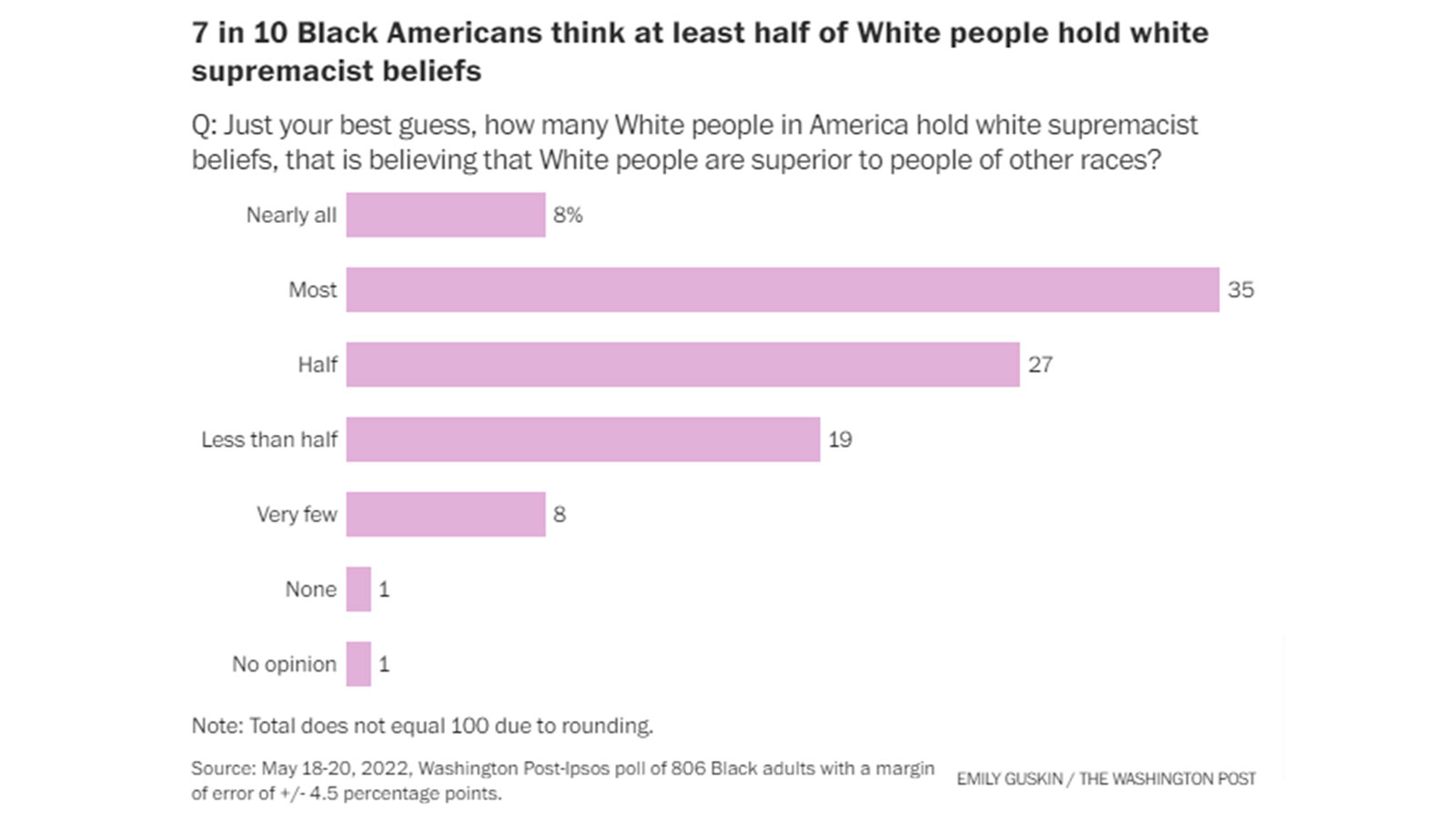 Black Americans cite a range of factors that lead people to commit hate crimes against Black people in the United States. Sixty-three percent say access to guns contributes a “great deal” to people committing hate crimes, while 57 percent say the same about “personal family and upbringing.”
Black Americans cite a range of factors that lead people to commit hate crimes against Black people in the United States. Sixty-three percent say access to guns contributes a “great deal” to people committing hate crimes, while 57 percent say the same about “personal family and upbringing.”
Just over half, 52 percent, say social media contributes a great deal to hate crimes, 47 percent cite “blaming Black people for their problems,” 46 percent cite political leaders and 45 percent blame not enough teaching of tolerance in schools. Fewer cite mental health issues, a lack of personal connections to Black people or cable news.
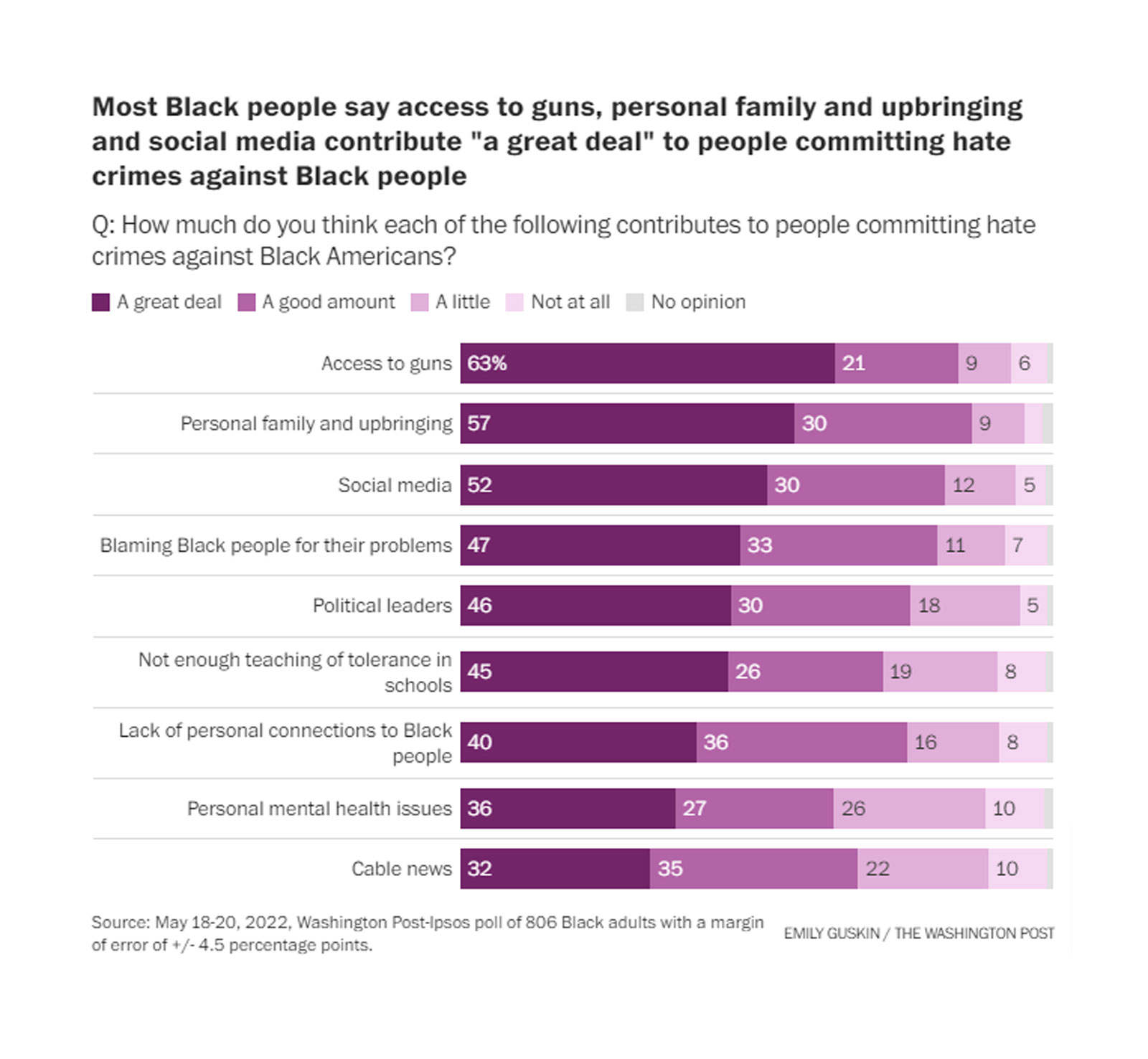 Black Americans’ fears of racially motivated attacks come atop broader disappointments about racial inequality two years after Floyd was killed in Minneapolis. A viral video of the incident sent millions across the country to the streets in protest, chanting “Black Lives Matter.” Dozens of elected officials across the country spoke out about the need for police reform and more sweeping changes to combat societal racism.
Black Americans’ fears of racially motivated attacks come atop broader disappointments about racial inequality two years after Floyd was killed in Minneapolis. A viral video of the incident sent millions across the country to the streets in protest, chanting “Black Lives Matter.” Dozens of elected officials across the country spoke out about the need for police reform and more sweeping changes to combat societal racism.
The poll finds 80 percent of Black people saying that the police in their communities treat Black people less fairly than White people, which grows to 88 percent when asked about police nationally. Both represent overwhelming majorities, if slightly lower than two years ago.
The reaction to Floyd’s death initially spurred some optimism that police treatment of Black Americans would improve, and that Whites’ concerns about discrimination against Blacks would grow. But now, two years after the May 25, 2020, killing, much of that optimism has disintegrated.
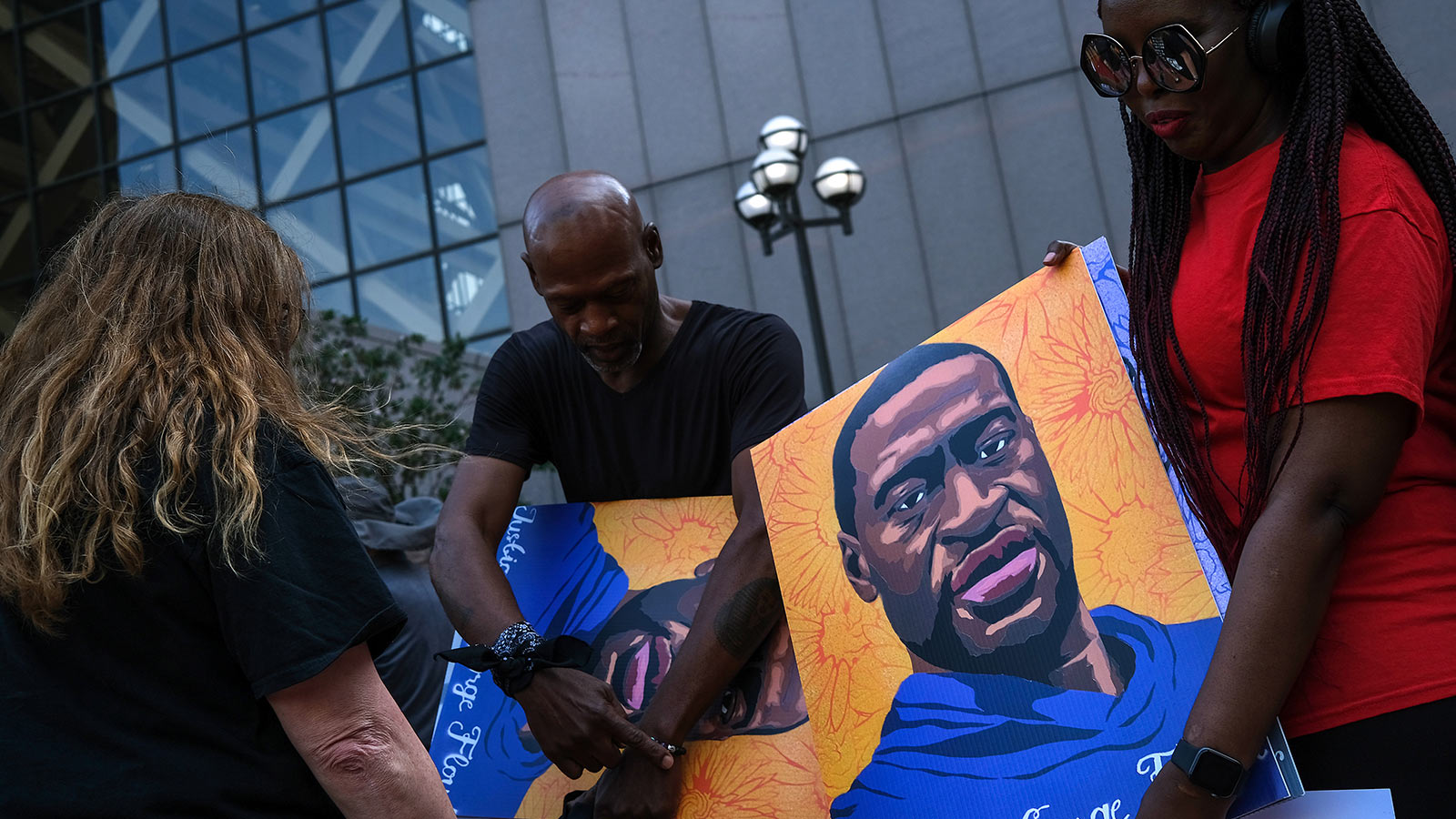
People attend a remembrance rally for George Floyd outside the Hennepin County Government Center on May 23, 2021, in Minneapolis. (Joshua Lott/The Washington Post)
In June 2020, at the height of the Black Lives Matter protests one month after Floyd’s death, 54 percent of Black Americans expected police treatment of Black Americans would improve in the coming years, according toa poll then. But today, less than half as many — 19 percent — say it actually did. Another 38 percent say police treatment has improved “a little,” while 41 percent say it has not improved “at all.”
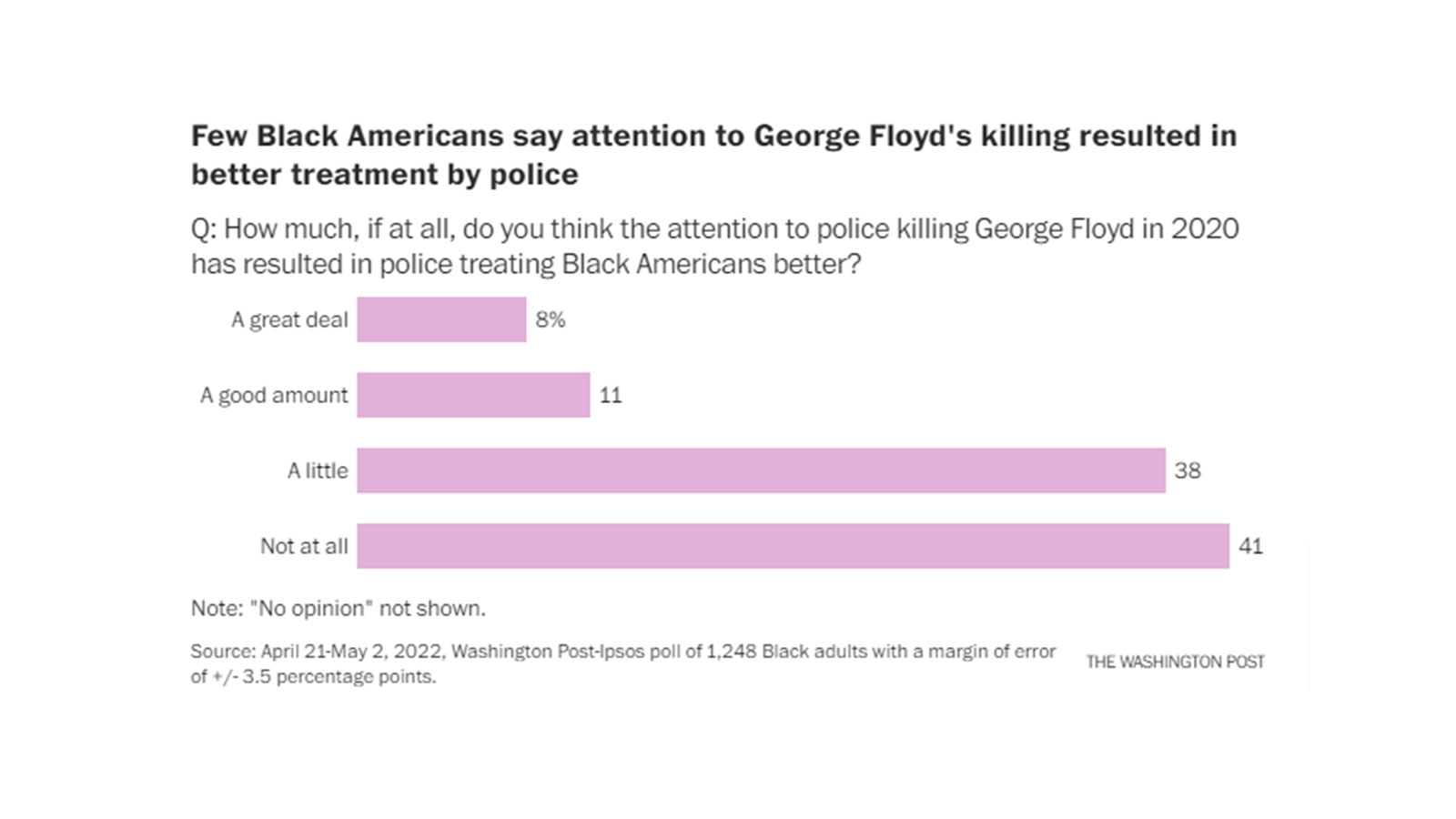 In June 2020, 59 percent of Black Americans thought it was likely that attention to Floyd’s killing would increase White Americans’ concerns about racial discrimination by police. Today, 30 percent of Black Americans believe concern has increased among White Americans.
In June 2020, 59 percent of Black Americans thought it was likely that attention to Floyd’s killing would increase White Americans’ concerns about racial discrimination by police. Today, 30 percent of Black Americans believe concern has increased among White Americans.
Carl Davidson, 61, of Oakland, Calif., said there have been incremental steps in the right direction. But there has also been a jolt backward. He said criticism of critical race theory, renewed gerrymandering efforts and other culture wars are part of the backlash.
“Pretty quick after ‘Black Lives Matter’ there were knee jerks with ‘Blue lives’ and ‘White lives matter.’ It was a misinterpretation, promulgating a zero-sum perspective, that if Blacks have rights, Whites have fewer rights,” said Davidson, a wine industry sales representative. “But we want what everyone wants. And it’s guaranteed by the Constitution.”
In that sense, he said, people seem bolder than ever before in making clear their anti-Black racism.
“The rock has been turned over and the racism is out there, and people feel a lot more free to express it,” he said.
The Post-Ipsos poll finds 65 percent of Black Americans say it is a “bad time” to be a Black person in America, up from 56 percent immediately before the Buffalo shooting and now matching the level of pessimism from January 2020, three years into Donald Trump’s presidency.
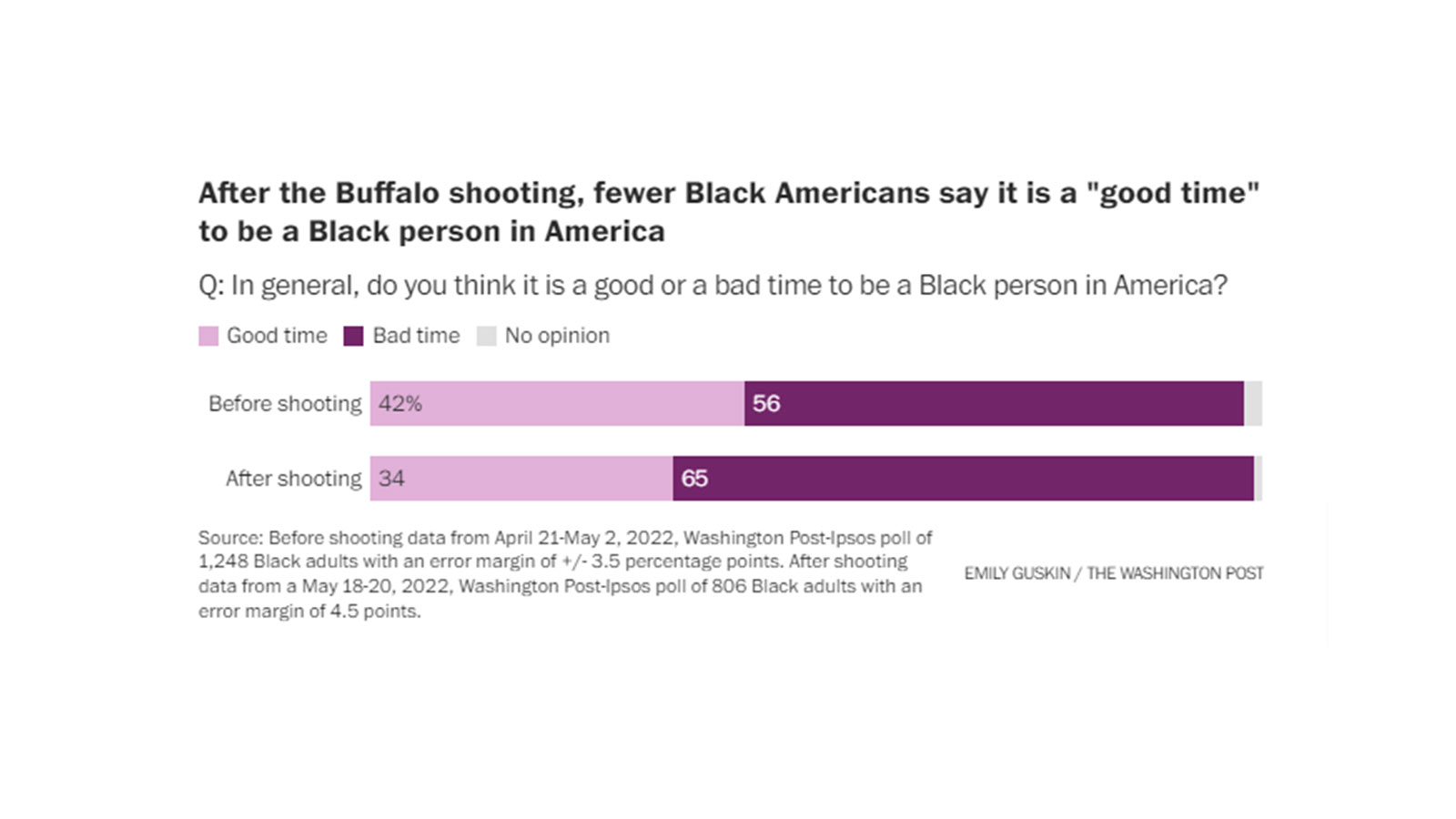 Even before the Buffalo shooting, racism, gun violence and police brutality were the top three threats listed by Black people in the poll, with between 84 percent and 86 percent saying each is a “major threat.”
Even before the Buffalo shooting, racism, gun violence and police brutality were the top three threats listed by Black people in the poll, with between 84 percent and 86 percent saying each is a “major threat.”
Majorities of Black Americans also called other issues major threats to Black people in America, including 82 percent who cited the criminal justice system, 76 percent the cost of health care, 73 percent restrictions on voting rights, 72 percent lack of economic opportunity and 71 percent drugs. Another 61 percent of Black people said lack of access to education is a major threat, while about half said the same for pollution (53 percent) and climate change (47 percent).
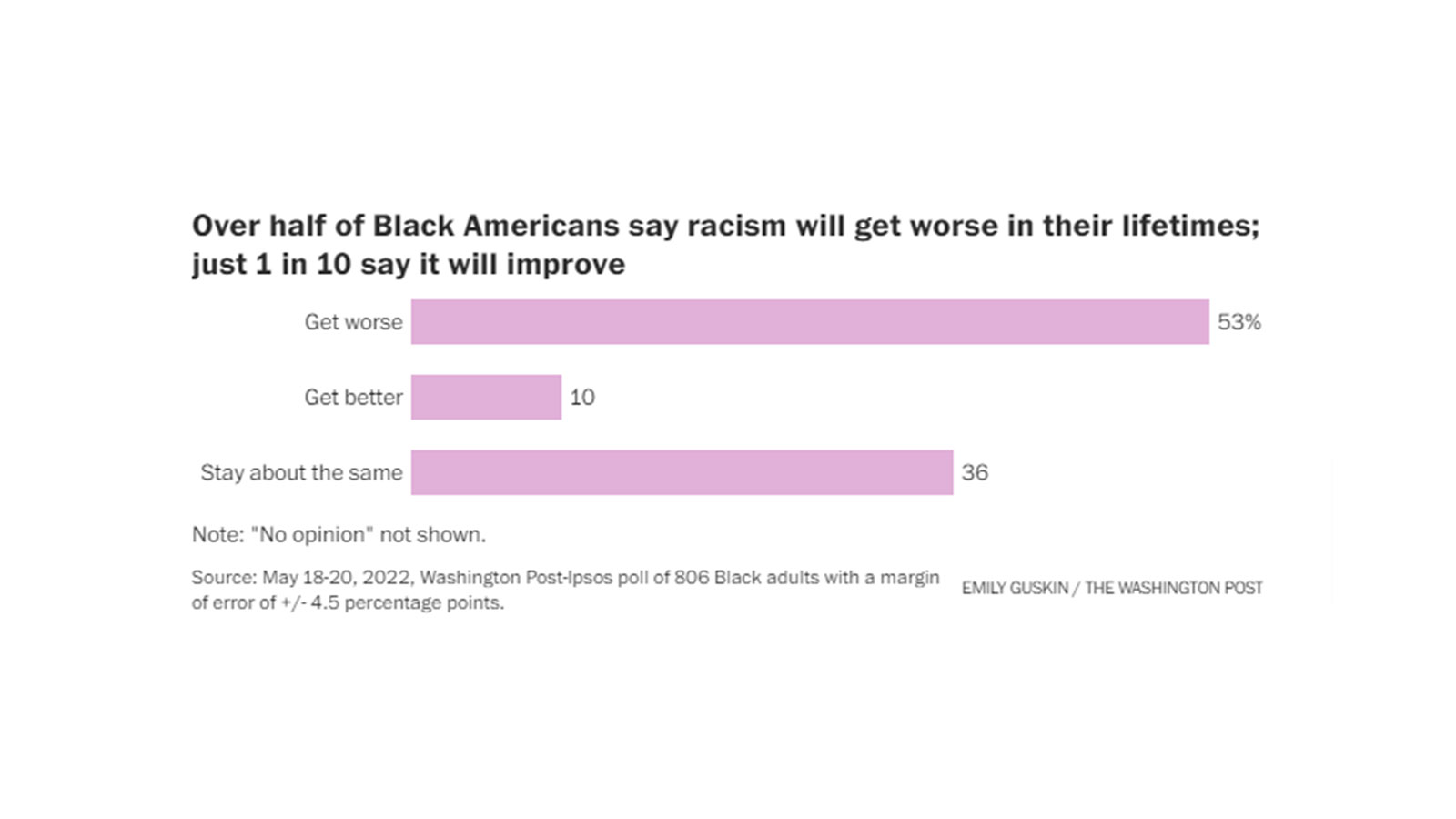 In Memphis, Dexter Banks, the son of civil rights activists, said that overt racism and White nationalism is being tolerated even more by mainstream Americans of all backgrounds — particularly White Americans.
In Memphis, Dexter Banks, the son of civil rights activists, said that overt racism and White nationalism is being tolerated even more by mainstream Americans of all backgrounds — particularly White Americans.
To Banks, 48, it is evidence that powerful forces are at work to rationalize what happened to Floyd and to the victims in Buffalo’s East Side community, blunting the push for substantive changes in the treatment of Black Americans.
Racism “is considered to be more of an expression of free speech as opposed to what it really is,” said the Memphis resident. “With what happened in Buffalo or to Floyd, you oftentimes hear from one side, specifically conservatives, that it’s just an isolated incident or a few bad apples, but it’s never recognized as part of a large systemic issue.”
When it came to suffering a racist attack, the source of Johnathon Davis’s greatest fear used to be police. But now, he worries about everyday White people who he thinks could be secretly extremist, racist and armed.
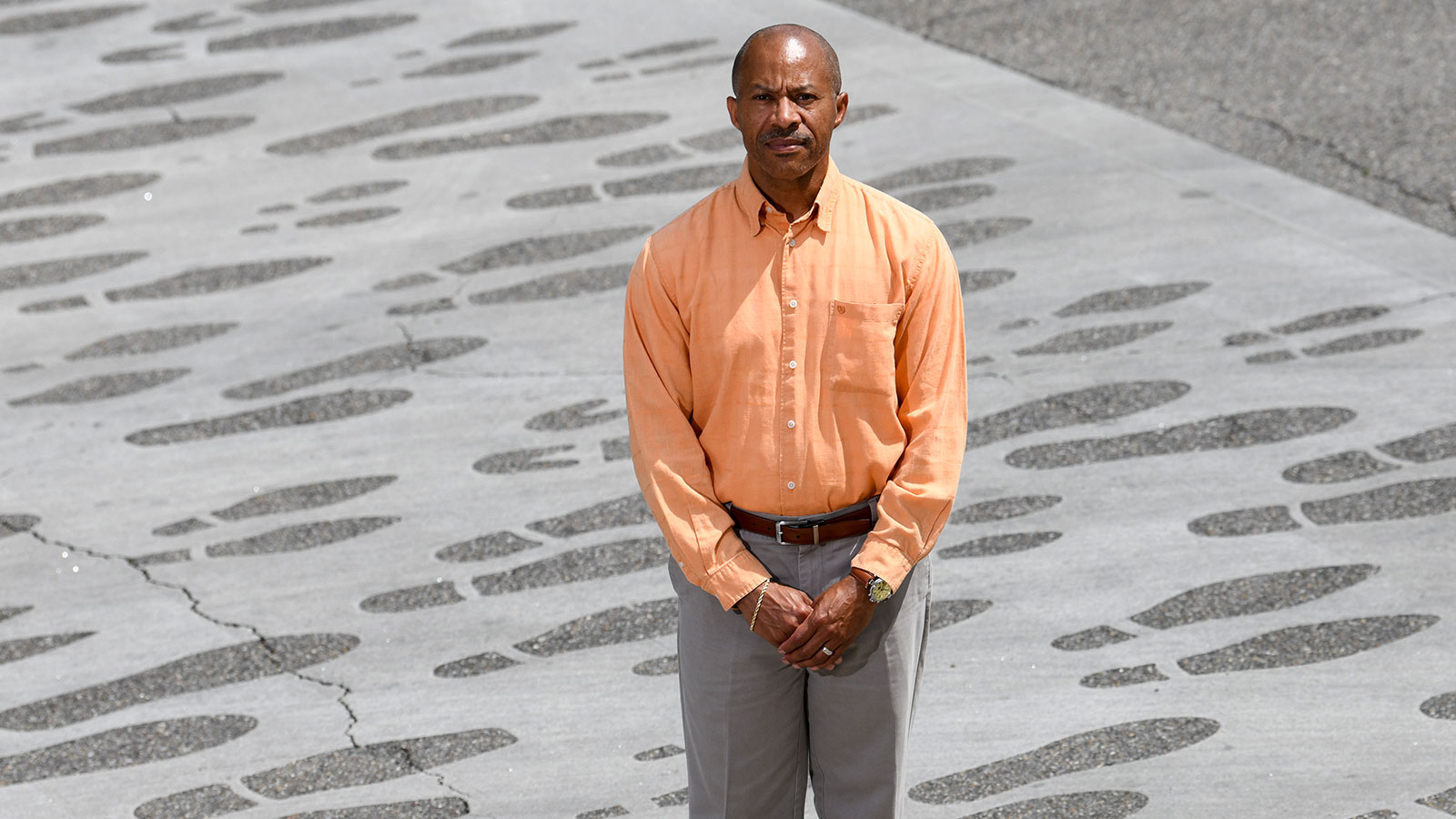
Poll participant Johnathon Davis stands on a crosswalk commemorating the 1965 Selma-to-Montgomery March in Montgomery, Ala. (Julie Bennett for The Washington Post)
“At least [with] the police you kind of have some idea of the people you’re dealing with, but the neighbor next door? You have no idea what goes on when the door is closed,” Davis, 57, said.
He catches himself being apprehensive at stoplights, imagining a White man getting out and shooting him in his car. In grocery stores, he’s hyperaware of his surroundings, he said, watching White people’s movements as they reach inside their pockets.
But there are a small group of Black Americans who are unconcerned about being targeted for the color of their skin. D. Thompson, a Florida elementary school teacher who did not want to publish her full name due to fear of retribution, said that police treat people of all races equally.
Floyd’s murder got people talking and put the country on a path to improvement, she said. But “it was one isolated incident and not the norm. It was unfortunate, and I’m sorry a man lost his life, but it’s not holding me back,” Thompson said.
Thompson, a Republican, immigrated from the Bahamas in the 1990s. She said that background gives her a different perspective on race. “I don’t wake up thinking what will happen to me because I’m Black in America,” she said.
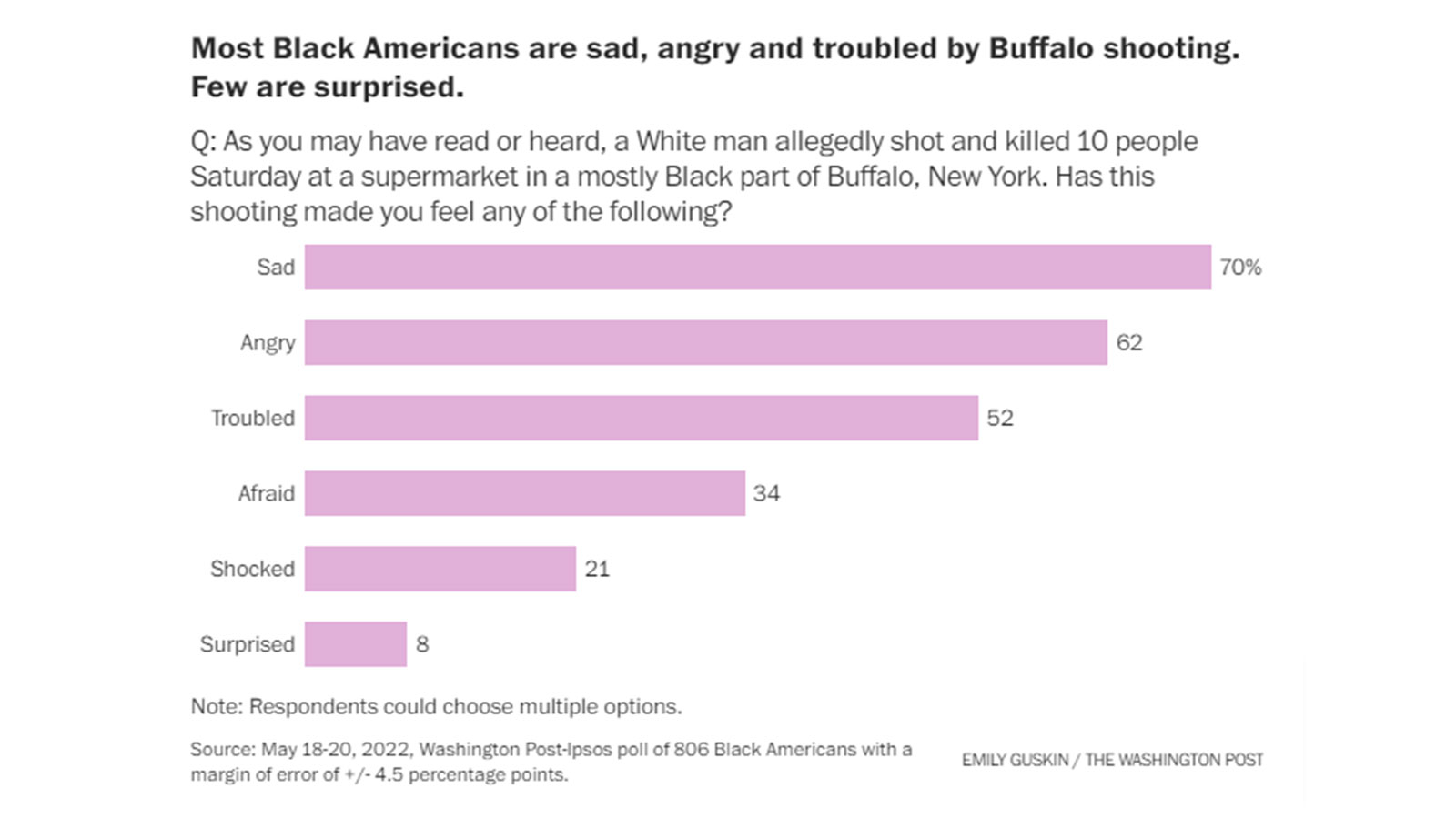 In a small town near Fort Lauderdale, Fla., Kwanza Boykin, 43 and a Democrat, recalled learning the racial hierarchy in the United States when she was only a child. She would occasionally accompany her grandmother, who was a maid, when she was cleaning houses. The homeowners were always White. She said the dynamic stuck with her.
In a small town near Fort Lauderdale, Fla., Kwanza Boykin, 43 and a Democrat, recalled learning the racial hierarchy in the United States when she was only a child. She would occasionally accompany her grandmother, who was a maid, when she was cleaning houses. The homeowners were always White. She said the dynamic stuck with her.
A particularly vivid memory stems from when she was 5 or 6 years old, and she and her grandmother were looking through a Macy’s storefront window. A store employee came out and sharply told them they wouldn’t be allowed in the store.
Her grandmother said, “No, I was just showing my granddaughter all the beautiful lights,” Boykin, who is a notary, said. “But from that point on … I thought, there’s racism out there.”
To her, that racism still lurks, affecting everything she does and threatening physical harm. Black people’s status in the country “is still the same status. Ain’t nothing improved at all for Black people,” she said.
Black Americans have nuanced opinions on the best way to solve crime in their communities, according to the Post-Ipsos poll. A 72 percent majority say increasing the number of police officers patrolling communities would reduce crime, though an even larger 86 percent majority say more funding for economic opportunities in poor, higher-crime neighborhoods would have an impact. About two-thirds of Black Americans (68 percent) say violence interruption programs would be effective at reducing crime, while 61 percent say the same for increasing prison sentences for gun crimes.
When asked which of these options would be most effective, 55 percent chose increasing funding to build economic opportunities while 24 percent chose increasing police patrols.
By contrast, White Americans are roughly split between funding economic opportunities in poor communities with high crime (37 percent) and increasing the number of police officers on patrol (42 percent), according to the survey.
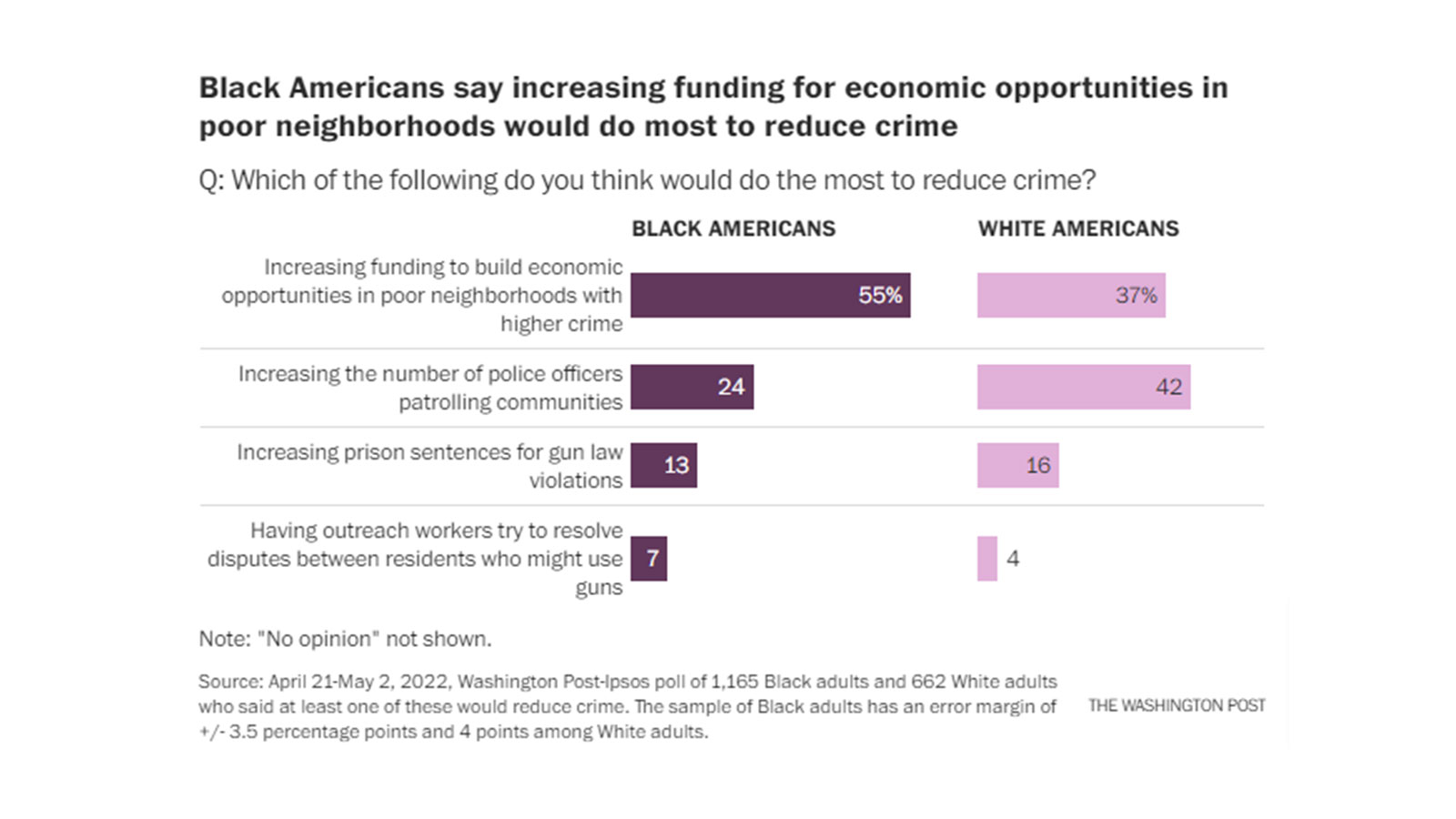 The Post-Ipsos poll finds roughly 1 in 4 Black Americans say they have considered buying a gun to protect themselves after the Buffalo shooting. If all of this group did so, it would double the rate of Black gun ownership.
The Post-Ipsos poll finds roughly 1 in 4 Black Americans say they have considered buying a gun to protect themselves after the Buffalo shooting. If all of this group did so, it would double the rate of Black gun ownership.
Davis, an IT program analyst for the state of Alabama, said he is considering arming himself.
“My son went out and just purchased his first gun because of this. And I got rid of all my guns because I have a young child at home, but now I’m thinking maybe I do need to have a gun, because what if they take it to a different level coming into the neighborhood, kicking down doors and shooting people in them?” he said.
But Davis did have a hopeful vision for the future of the country’s race relations.
“I think the solution is learning to coexist. That’s the only way,” Davis said. “We can learn to live in the same community because at the end of the day we have similar values, we want children to be educated, we want them to go to college and do good in life and we want the same for ourselves. We’re working hard, Black and White, most of us, to provide for our families.”
Video caption: Ahead of President Biden’s visit, local activists share their hopes for how they’d like to see the administration help the community. (Video: Zoeann Murphy, Alice Li/The Washington Post)
Cannon, the Buffalo resident, was thrown to the ground and arrested as a 15-year-oldin Syracuse after she saw police arrest her brothers and ran up to see what was going on. She said she will never understand why she was taken into custody so violentlythat she emerged from her holding cell with a badly bruised back. And she will never understand how the 18-year-old White man accused in Buffalo could contain so much hatred for people like her.
“I don’t believe there will ever be a solution for it. And it’s bad to say it like that, but it’s like every day you never know what’s going to happen. Sometimes you be scared to go outside,” she said. “I don’t understand what African Americans did to anybody.”
The Post-Ipsos poll was conducted through the Ipsos KnowledgePanel April 21 through May 2 among a random national sample of 1,248 non-Hispanic Black adults with a partially overlapping sample of 977 U.S. adults. Results among Black Americans and Americans overall have a margin of sampling error of plus or minus 3.5 percentage points. A follow-up survey re-interviewed 806 Black respondents May 18-20; results for that subsample have an error margin of 4.5 points.
Soure: The Washington Post
Featured image: People visit a memorial for victims of the May 14 shooting at a Tops grocery store in Buffalo. (Heather Ainsworth for The Washington Post)

